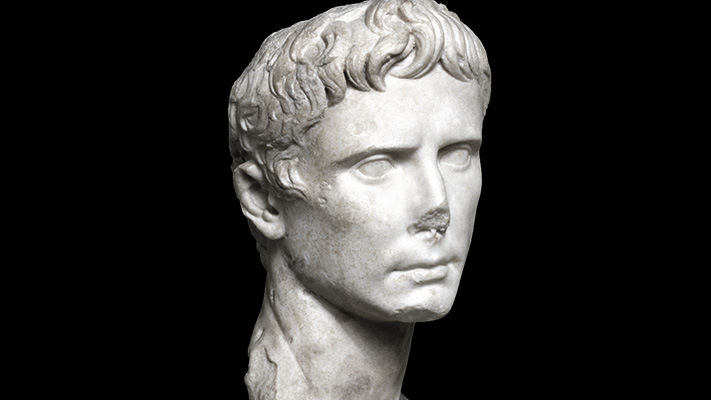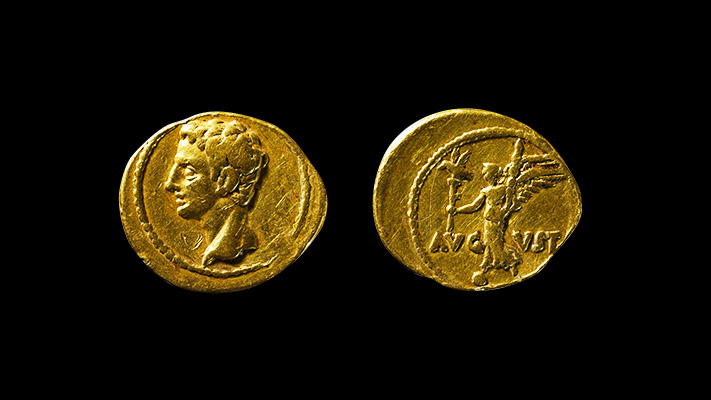
Augustus' life
Augustus was one of the most important characters in history. He founded the roman empire, which held domain over all the countries facing onto the mediterranean sea, over time stretching to the north to germany and great britain and to the east to the shores of the caspian sea. That empire has left a deep cultural mark, the most obvious signs of which are still alive in many countries of the world, in the language, in law and works of civil engineering. Only two people have their name remembered in the calendar: augustus, with the month of august, and julius caesar, augustus’ adoptive father and at the former’s wishes associated with the name for the month of july.
Birth
Gaius julius caesar octavius augustus was born in rome, in a house on the palatine hill, on 23rd september of 63 bc, with the name of gaius octavius. His father, also called gaius octavius, was descended from a rich family from velletri and his mother, atia balba cesonia, was daughter of julia, sister of julius caesar, and of marcus atius balbus.
The young gaius octavius lost his father at the age of four and was educated by his great-uncle julius caesar, who took care of his cultural and military training.
Education
As a boy caesar sent him to apollonia to study under the guidance of apollodorus of pergamon. Augustus departed with gaius cilnius maecenas and marcus vipsanius agrippa, who were to remain his good friends and advisers for the rest of his life. It was in apollonia that he became aware of the death of julius caesar, killed by a conspiracy organised by a group of senators who considered caesar’s increasing power to be a danger to the roman republic.
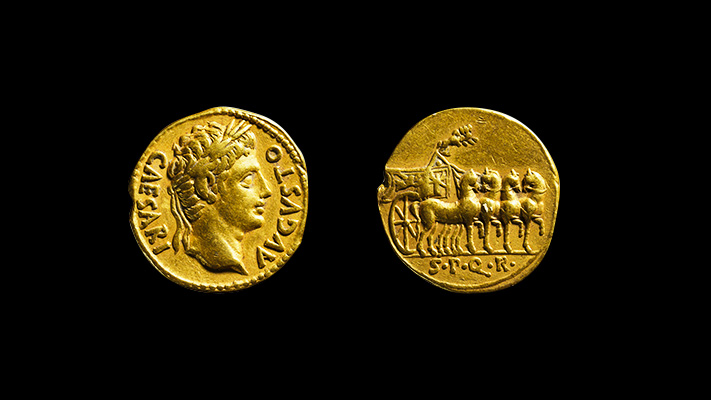 Aureus of Augustus, obverse head of Augustus, CAESAR AVGVSTVS; reverse quadriga, SPQR, Musei Capitolini, Medal Collection, Rome.
Aureus of Augustus, obverse head of Augustus, CAESAR AVGVSTVS; reverse quadriga, SPQR, Musei Capitolini, Medal Collection, Rome.
Spqr: “the senate and the roman people”
After the famous seven kings, rome had always been republican. The senate and the popular assemblies elected the magistrates and two consuls, who governed together. The visible sign of this system of government has remained one of the symbols of the city: spqr (senatus popolusque romanus – the senate and the roman people).
In difficult times a dictator could be elected in the place of the two consuls, and he took the decisions alone, but could not remain in the office for more than six months.
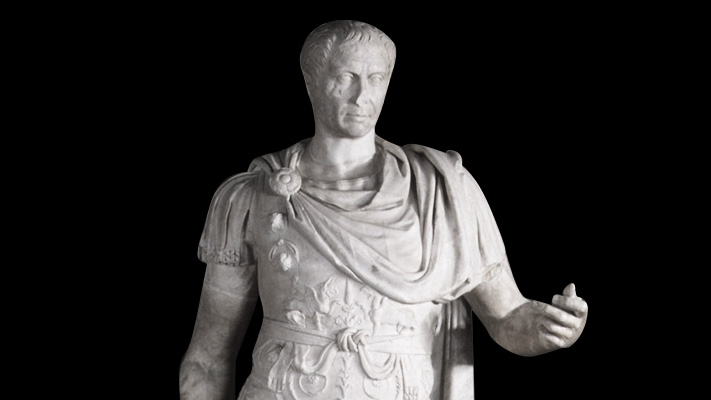 Loricate statue of Julius Caesar, Musei Capitolini, Palazzo Senatorio, Rome.
Loricate statue of Julius Caesar, Musei Capitolini, Palazzo Senatorio, Rome.
Caesar's will
Julius caesar, victorious in his military campaigns, adored by the people and the army and extremely wealthy, had succeeded in being elected dictator for life and, even if he shared the consulate with his trusted friend mark antony, he had de facto total control of rome, and this excess of personal power cost him his life.
In 44 bc, aged just 19, when caesar’s will was read out publicly, augustus discovered that he had been adopted by his great-uncle, who made him heir to his fortune and designated him as his successor.
The triumvirate
The choice was not looked favourably upon by the other aspirants to power, but, after a few months of clashes, an agreement was reached between augustus, mark antony and marcus aemilius lepidus, who governed together, dividing up the territories between them.
This agreement was ratified by the senate in 43 bc through the creation of the magistracy of the triumvirate, which was to last around ten years. The following year, the battle of philippi decreed the definitive defeat of brutus, cassius and sextus pompey, who had organised the conspiracy against julius caesar and were now fierce adversaries of his heir augustus and his allies.
In 40 bc the treaty of brundisium was signed, dividing up the control of the territories among the triumvirs. Anthony took the east, lepidus africa, while octavian augustus governed in the west.
The final battle
Lepidus claimed sicily, recently taken from sextus pompey, for himself, so augustus, having defeated pompey, remained the only one in command of the western part of the roman territories, while antony controlled the east.
However, the peace between the two was not destined to last long and the military and political competition concluded in 31 bc with the naval battle of actium, during which augustus’ fleet, commanded by agrippa, defeated the ships of antony and his wife cleopatra, the powerful queen of egypt.
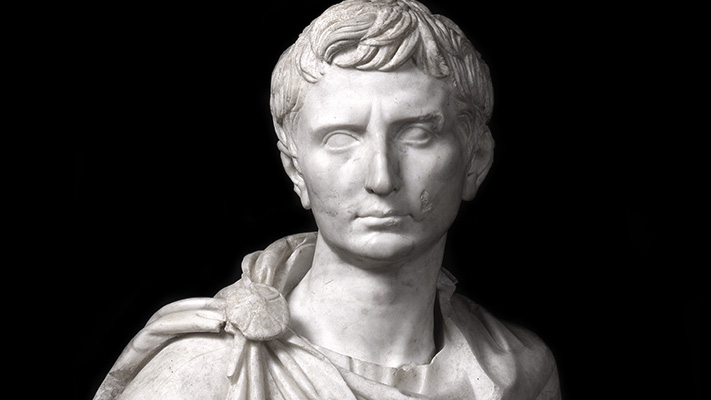 Bust of Octavian, so-called “Actium” type, Musei Capitolini, Palazzo Nuovo, Rome.
Bust of Octavian, so-called “Actium” type, Musei Capitolini, Palazzo Nuovo, Rome.
Res publica restituta
Augustus, now alone in power, had to show how he intended to govern. The people wanted him to guide the state; the senate offered him the dictatorship, but augustus was sure that a peace based on his authority and not on the consent of all would be uncertain. In a famous session in january of 27 bc, he returned the res publica into the hands of the senate and the roman people, foregoing the special roles that had been conferred on him during the war against antony. The people and the senate of rome were not ready to lose their republican cultural identity, so augustus returned the power into the hands of the republic.
He comments in his autobiography (res gestae 34): “from then on i was the first for consideration and influence, but i did not have greater power than those of my colleagues who were magistrates”
In reality this was merely a formal act and augustus, by assuming a series of interconnected offices, ensured that power was still held tightly in his own hands.
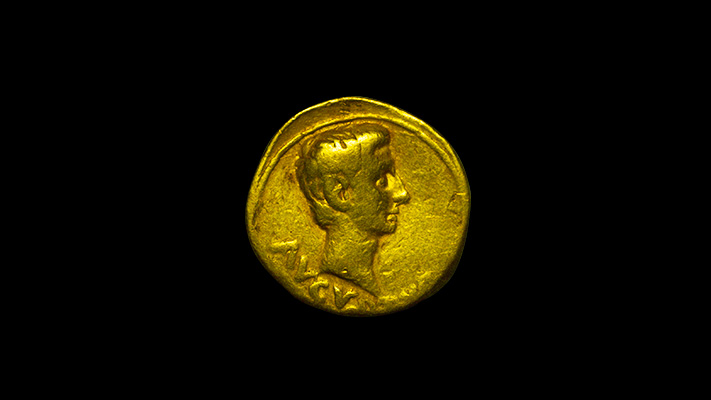 Aureus of Augustus, Portrait of Augustus (obverse), Musei Capitolini, Medal Collection, Rome.
Aureus of Augustus, Portrait of Augustus (obverse), Musei Capitolini, Medal Collection, Rome.
The reforms
Augustus governed for forty years, during which he transformed the roman people of farmers and soldiers into imperial citizens, masters of the world, well administered, culturally well educated and technically insuperable.
He reformed every sector of the state: the army, justice, religion. He created a number of specialist military corps to handle public order in the city and the praetorian guard for the emperor’s personal protection; he introduced laws to defend the family and social policies to support the poorest members of the population; he guaranteed discharged soldiers a life annuity and he built great public works, thermal baths and aqueducts. He transformed rome into a monumental city, the worthy capital of a powerful empire. In the economic sphere he organised the monetary system and facilitated commercial exchanges. In short, he did everything that politicians promise in electoral campaigns.
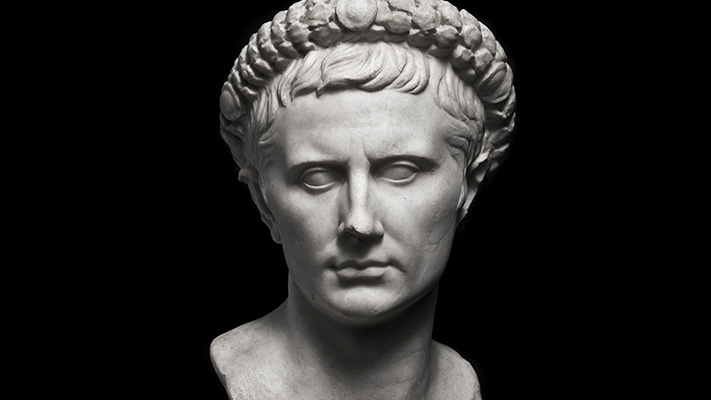 Head of Augustus, so-called “Forbes” type, Musei Capitolini, Palazzo Nuovo, Rome.
Head of Augustus, so-called “Forbes” type, Musei Capitolini, Palazzo Nuovo, Rome.
Absolute power
His career was wisely managed in a gradual way and all the powers and honours were assigned to him by the senate and not due to his personal choice.
Already before the battle of actium he had received the title of imperator, which was reserved for victorious generals, while that of augustus was conferred on him after the victory at an assembly on 16th january of the year 27 bc. Augustus, which means worthy of veneration, was to be the name the historians would choose to remember him by in future centuries.
From 31, the senate elected him as consul every year and conferred upon him the imperium proconsulare (military and executive power over the provinces), and finally in 23 bc augustus received the office that unquestionably marked the beginning of imperial power, then that is life-long tribunicia potestas [tribunician power], now augustus could intervene in any administrative matter, had the right to veto any decision of which he did not approve, and all the provinces, both the imperial ones, already under his control, and the senatorial ones, until then governed by consuls, reported to him.
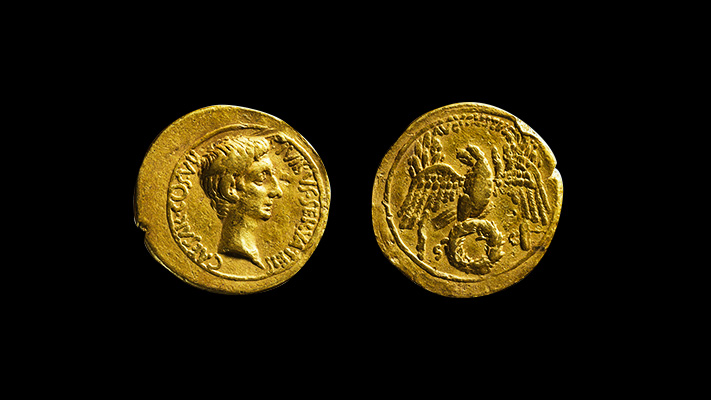 Aureus of Augustus, obverse head of Augustus, CAESAR COS VII CIVIBVS SERVATEIS; reverse eagle with wings unfurled over crown, AVGVSTVS S-C, Musei Capitolini, Medal Collection, Rome.
Aureus of Augustus, obverse head of Augustus, CAESAR COS VII CIVIBVS SERVATEIS; reverse eagle with wings unfurled over crown, AVGVSTVS S-C, Musei Capitolini, Medal Collection, Rome.
The pax romana
Augustus gave the empire 40 years of peace, making it go down in history with the name of pax romana, even if he was committed militarily on the frontiers to the north in europe, to the east in asia and to the south in africa in order to maintain the boundaries of the lands conquered in the republican period.
During his reign a group of powerful people always existed who were against his ascent to power in the name of the defence of a republic that no longer existed. Augustus always had to take care to protect his life and to foil conspiracies; it seems that even his only daughter julia participated in the most important of these, and she was to be exiled from that moment onwards, but her father spared her life.
His heirs
Although augustus succeeded in defending his own life, he was not sufficiently able to defend his heirs. He had just one natural daughter, julia, whose mother was scribonia, whom augustus divorced on the very day of the birth of their daughter to marry livia drusilla soon afterwards, and she was to remain at his side until his death.
As a woman, julia could not aspire to the throne; augustus’ chosen heir was marcellus, son of his sister octavia. Marcellus married julia so it would be clear to all that the state would pass into his hands, but he died just two years later.
In her second wedding julia married marcus agrippa, her father’s great friend, by whom she had two children, lucius and caius, but they too died young.
His death and the succession
It was livia, augustus’ wife, who guaranteed the descent; she supported tiberius, a child from her previous marriage, and he would indeed become the second roman emperor.
The fact that tiberius survived all the calamities that fate held in store for the other heirs already gave rise to the suspicion, on the part of roman historians, that livia had some role in the “accidental death” of the others, and perhaps also of augustus himself, who was on his deathbed, so that he did not change his mind at the last moment.
But this is just hearsay, the official version by suetonius is that augustus, in his last words, said to livia “live in the memory of our marriage. Goodbye”.
However, it was to be augustus himself who dealt with handing down his exploits to history, by engraving the res gestae divi augusto (the acts of the divine augustus) on bronze tablets; this was a kind of autobiography that was to be placed near to the mausoleum. Fortunately many copies of this text have been made on marble slabs and that placed for on the temple of rome and augustus in ankara has come down to us. A modern copy is now to be found on the side of the museum of the ara pacis facing towards the mausoleum of augustus.

